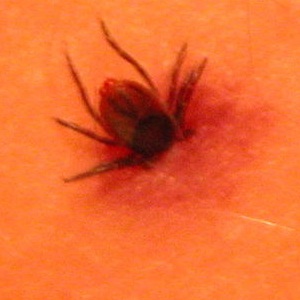Tick Bites May Cause Red Meat Allergy
By Chris Williams on June 12, 2013.
 Not only do we have to deal with several different types of ticks that can spread several different diseases, now we have a tick that can cause an allergy to red meat! Sounds like an internet urban legend, doesn’t it?
Not only do we have to deal with several different types of ticks that can spread several different diseases, now we have a tick that can cause an allergy to red meat! Sounds like an internet urban legend, doesn’t it?
Scientists have confirmed that saliva in the bite of the lone star tick can result in a delayed allergic reaction when red meat is eaten…in some individuals. Cases of the allergy were first discovered in 2007 and seem to be increasing in number as populations of the lone star tick increase.
How the connection was discovered is a complicated medical mystery involving the development of antibodies to a sugar found in red meat named alpha-gal, and a group of cancer patients from the “tick-belt” states who had an allergic reaction to their cancer drug which contained alpha-gal. One reason that no one had previously connected a tick bite with the allergic reaction is that the reaction may not first occur until weeks or even months after the tick bite.
The symptoms of the meat allergy usually occur 3 to 6 hours after an affected person eats beef, pork, or lamb. Hives and itching are often the first symptoms, but the allergic reaction can be very serious for some people, even resulting in anaphylaxis and breathing difficulties that can be fatal. Fortunately, no fatalities have been reported to date.
The lone star tick was originally a tick of the southeastern U.S., but its range has spread significantly in recent years. In the northeast, it now occurs in all but extreme northern New England. The lone star tick is found in the southern half of New York, all of Massachusetts, in southern New Hampshire and Vermont, even into lower Maine. Like other ticks, the lone star can transmit a number of different diseases, including ehrlichiosis, tularemia, and Rocky Mountain spotted fever. It does not cause Lyme disease, although its bite may leave a rash similar to the Lyme “bull’s eye” rash. The female lone star tick is easy to identify since she has a large white dot in the middle of her back.
Strangely enough, some allergic people react strongly to pork sausage or lamb, but have little response to lean roast beef. Other highly allergic individuals react even to chicken sausage in pork casings, or to gel-cap vitamins since gelatin is made from animal byproducts. The good news is that the allergic reaction seems to lessen after a few years as long as the person is not bitten again by a lone star tick. Some who keep getting bitten by ticks have sworn off meat for good. “I dream about eating a steak,” said one, “but I wouldn’t take the risk.”
Since this tick/meat allergy has just recently been diagnosed, it’s possible that many people who have had allergic reactionsto red meat for years, actually developed that allergy from a tick bite. Early studies indicate that the development of antibodies to alpha-gal after a tick bite and development of the allergy seems to run in families. The tick connection may also account for meat allergies in dogs.